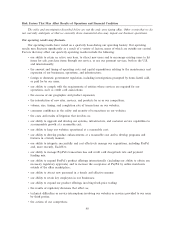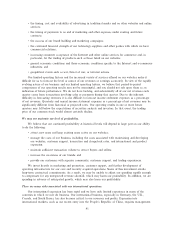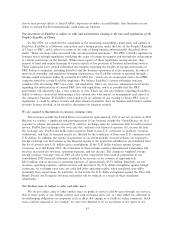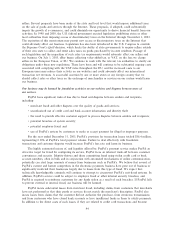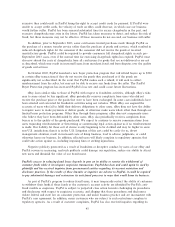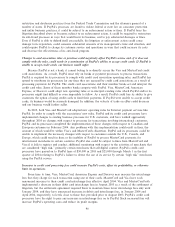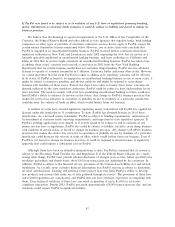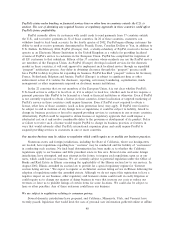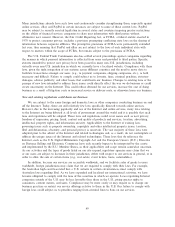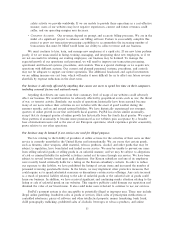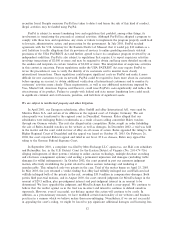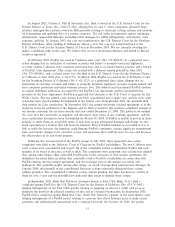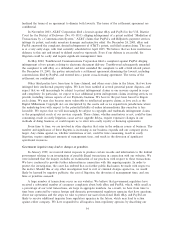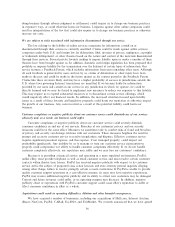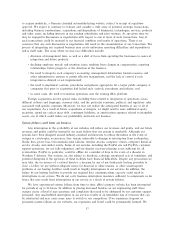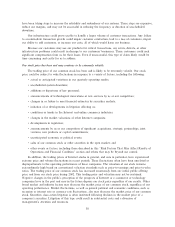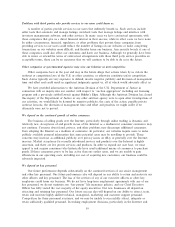eBay 2003 Annual Report Download - page 51
Download and view the complete annual report
Please find page 51 of the 2003 eBay annual report below. You can navigate through the pages in the report by either clicking on the pages listed below, or by using the keyword search tool below to find specific information within the annual report.Many jurisdictions already have such laws and continuously consider strengthening them, especially against
online services. eBay and PayPal in certain instances are subject to some of these current laws. PayPal
may be subject to recently enacted legislation in several states and countries imposing greater restrictions
on the ability of Ñnancial services companies to share user information with third parties without
aÇrmative user consent. However, the Fair Credit Reporting Act, or FCRA, a federal statute enacted in
1970 to protect consumer privacy, includes a provision preempting conÖicting state laws on the sharing of
information between corporate aÇliates. The preemptive provisions of FCRA were permanently extended
last year, thus ensuring that PayPal and eBay are not subject to the laws of each individual state with
respect to matters within the scope of FCRA, but remain subject to the provisions of FCRA.
The U.S. Federal Trade Commission also has settled several proceedings against companies regarding
the manner in which personal information is collected from users and provided to third parties. SpeciÑc
statutes intended to protect user privacy have been passed in many non-U.S. jurisdictions, including
virtually every non-U.S. jurisdiction in which we currently have a localized website. Compliance with these
laws, given the tight integration of our systems across diÅerent countries and the need to move data to
facilitate transactions amongst our users (e.g., to payment companies, shipping companies, etc.), is both
necessary and diÇcult. Failure to comply could subject us to lawsuits, Ñnes, criminal penalties, statutory
damages, adverse publicity, and other losses that could harm our business. Changes to existing laws or the
passage of new laws intended to address these issues could directly aÅect the way we do business or could
create uncertainty on the Internet. This could reduce demand for our services, increase the cost of doing
business as a result of litigation costs or increased service or delivery costs, or otherwise harm our business.
New and existing regulations could harm our business.
We are subject to the same foreign and domestic laws as other companies conducting business on and
oÅ the Internet. Today, there are still relatively few laws speciÑcally directed towards online services.
However, due to the increasing popularity and use of the Internet and online services, many laws relating
to the Internet are being debated at all levels of government around the world and it is possible that such
laws and regulations will be adopted. These laws and regulations could cover issues such as user privacy,
freedom of expression, pricing, fraud, content and quality of products and services, taxation, advertising,
intellectual property rights, and information security. Applicability to the Internet of existing laws
governing issues such as property ownership, copyrights and other intellectual property issues, taxation,
libel and defamation, obscenity, and personal privacy is uncertain. The vast majority of these laws were
adopted prior to the advent of the Internet and related technologies and, as a result, do not contemplate or
address the unique issues of the Internet and related technologies. Those laws that do reference the
Internet, such as the U.S. Digital Millennium Copyright Act and the European Union's (E.U.) Directive
on Distance Selling and Electronic Commerce have only recently begun to be interpreted by the courts
and implemented by the E.U. Member States, so their applicability and scope remain somewhat uncertain.
As our activities and the types of goods listed on our site expand, regulatory agencies may claim that we
or our users are subject to licensure in their jurisdiction, either with respect to our services in general, or in
order to allow the sale of certain items (e.g., real estate, event tickets, boats, automobiles).
In addition, because our services are accessible worldwide, and we facilitate sales of goods to users
worldwide, foreign jurisdictions may claim that we are required to comply with their laws. For example,
the Australian high court has ruled that a U.S. website in certain circumstances must comply with
Australian laws regarding libel. As we have expanded and localized our international activities, we have
become obligated to comply with the laws of the countries in which we operate. Laws regulating Internet
companies outside of the U.S. may be less favorable than those in the U.S., giving greater rights to
consumers, content owners, and users. Compliance may be more costly or may require us to change our
business practices or restrict our service oÅerings relative to those in the U.S. Our failure to comply with
foreign laws could subject us to penalties ranging from criminal Ñnes to bans on our services.
49



